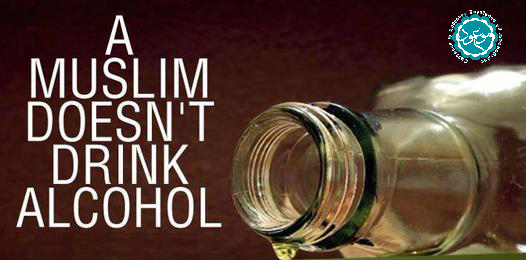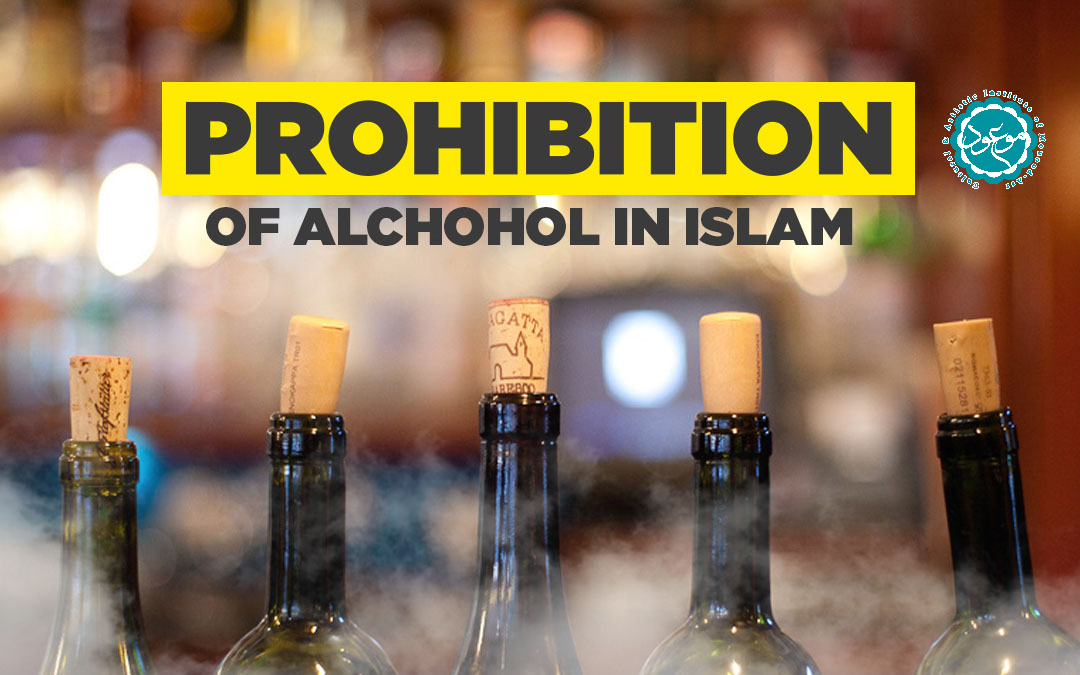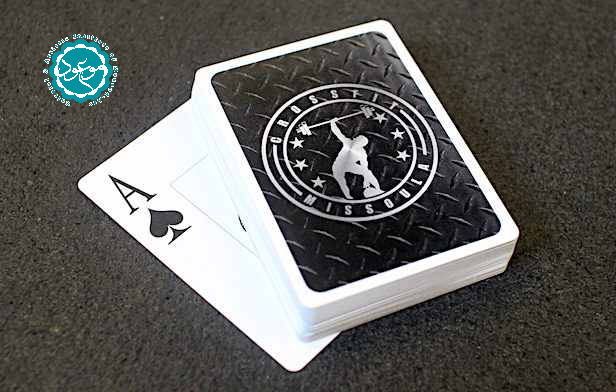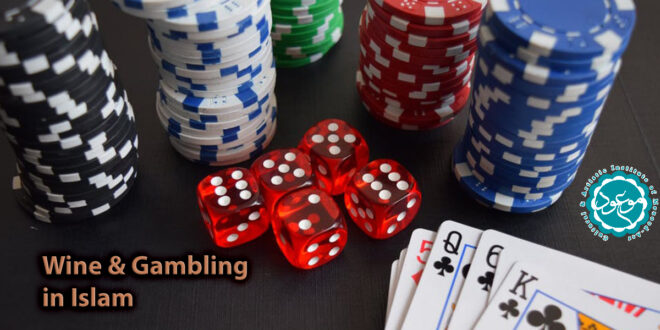According to Mouood, quoting by erfan.ir:
Wine and Gambling in Islam
Wine Contains No Cure
Drunkard on the Death-bed
Abu Basir says that Umme Khalid Abadiya presented herself before Imam Ja’far as-Sadiq (a.s.) when Abu Basir was also present. Umme Khalid said,
“May I be sacrificed for you, on the day of Qiyamat I will tell Allah that I have done as commanded by Ja’far ibn Muhammad (a.s.). Physicians have told me to knead the flour with grape wine and eat the bread. This will cure the terrible pain of my heart. I ask you, shall I do this?”
Imam Ja’far as-Sadiq (a.s.) replied to Umme Khalid,
“No! By Allah I will not permit you even a drop of wine. Don’t taste even a drop of it. Otherwise when your soul reaches here (Imam pointed towards his throat) you will only regret.” Then Imam (a.s.) asked Umme Khalid thrice.
“Have you understood?”
“Yes”, replied Umme Khalid.
A student of Fuzail Ibne Ayaz was on his deathbed. Fuzail came to him and sitting near his head began to recite Surah Yasin (al-Quran, chapter 36). The disciple told his teacher, “Do not recite the Quran!” Fuzail became silent. Then he began to urge his disciple to repeat “La ilaha illallah”. The student said:
“I will not repeat this formula because I am disgusted with it!” and he died in the same condition.
Fuzail Ibne Ayaz was extremely perturbed. He returned home after completing his duties and went to sleep. He saw his student undergoing punishment. He asked him, “What is the reason of your being deprived of faith (Imaan) at the time of your death? You were one of my best students.”
The student replied: “There are three reasons, firstly, I used to backbite too much, secondly, I used to be jealous, thirdly, a physician had prescribed for my malady a cup of wine every year. He told me that if I do not drink, the disease would never be cured. Every year I drank one cup of wine.”
(Safinatun Behaar Vol. I Pg. 428)
Numerous traditional reports mention that “Haraam” things do not contain any cure. In the same way one must refrain from taking any medicine that contains even a drop of najis alcohol.

It is stated on page no 380 of the Journal of Anjuman Tablighate Islami:
“There is not a single doctor today who considers liquor to have any cure. No doctor permits even a small quantity of the same. If a physician prescribes liquor as a medicine for some cure, it must be understood that his medical knowledge is deficient.”
A hundred years ago some of the doctors and physicians believed that wine had some curative effects. But recent researches show that wine not only lacks any beneficial value but is in fact harmful. The molecules of alcohol on entering the blood stream affect the white blood corpuscles. These corpuscles perform the function of protecting the human body against infectious disease.
The white blood cells engulf the disease causing germs and exterminate them. Anything that impairs the functioning of these blood cells exposes a person to numerous diseases because his body is unable to protect itself. Some people think that wine helps in digestion. This is just a false notion. The reality is just the opposite. Actually wine causes indigestion. The food hardens in the stomach and becomes indigestible. You can experiment by pouring wine upon a piece of cooked soft meat. It will become tough like leather, and absolutely unchewable. Wine also destroys the digestive juices secreted by the stomach and leads to flatulence and indigestion. Wine destroys appetite. Besides, alcohol causes addiction and wine taken for medicinal purpose soon becomes an addiction that is difficult to get rid of. We may observe that some alcoholics emerge perfectly healthy even after years of addiction. But what is apparent may be different from reality. If a medical check up is carried out, it will reveal the deteriorating condition of the internal organs and the digestive system of these addicts. Besides, often the maladies are not associated with alcohol and are attributed to other factors. It should be also noted that alcohol affects some people more than others. Some have a hereditary capacity to withstand the rouging effects of alcohol. They should thank Providence for it and refrain from drinking so that they can protect their future generation from developing a weakness for it.
Punishment for Drinking Liquor
If a sane adult person, knowing that liquor is Haraam, consumes even a drop of it of his own accord and later confesses to it or is seen in the act of drinking by two just witnesses who testify, the Judge is obliged to award punishment to him.
However punishment cannot be awarded under the following conditions: If the individual who drinks it is a child, or an insane person, or one who is unaware of its prohibition, or one drinks it by mistake being under the impression that it is not liquor and realizes the truth afterwards, or one who drinks it under coercion and force, or one who is compelled to drink due to extreme thirst there being no other way of quenching it.
The Islamic penalty for drinking is eighty lashes. Eighty lashes are given when the person drinks it for the first time. If he repeats the act after receiving 80 lashes he is lashed 160 times. If he repeats the sin again and confesses, or two just witnesses testify before a Qazi (religious Judge) the punishment is tripled; i.e. 240 lashes. The fourth instance of the crime entails capital punishment. Some Mujtahids are of the opinion that capital punishment should be given when the sin is repeated the third time.
If a person confesses and repents before the testimony of two just witnesses, he is condoned. However after the testimony he cannot escape punishment. The drunkard cannot be punished while still intoxicated. He is punished only when he gets sober. If it is a man he is stripped above the waist and lashed from the shoulders and below. It is not allowed to hit the face or the private parts of the accused. If the accused is a woman she is lashed with her clothes on. If her dress is loose, it is made to stick to the body by tying it up. She is lashed in a sitting position.
If a person drinks wine at a sacred place, for example the Holy Kaaba or in a sacred period, like the month of Ramazan, he is lashed and also given a preventive punishment that is, he is beaten so much that he may not dare to repeat the crime.
Ibn Abil Hadid records the following incident in Sharh-e-Nahjul Balagha:
“Najashi was a famous poet of Kufa. He was originally from Yemen. He was among the army of Amirul Momineen (a.s.) at the Battle of Siffin. It was the first day of Ramazan when his friend, Abu Sammak instigated him to drink wine at the tavern. Under its intoxication he created such a bedlam that his neighbour was compelled to complain to Amirul Momineen Ali (a.s.). Hazrat summoned both of them. Abu Sammak fled but Najashi was arrested and brought by the people. By the order of the Imam (a.s.) he was detained for the night. The next day, before the congregation of Muslims he was stripped to the waist and lashed eighty times for drinking wine. After this he was given twenty more lashes. Najashi said, “Eighty lashes were for drinking wine, but why twenty more?” Imam (a.s.) replied,
“This is because you dared to drink during the month of Ramazan and did not respect its sanctity.”
(Furu Al Kafi, Chapter on Penal Code)
The relatives of Najashi were present in large numbers in the camp of Ali (a.s.). They were perturbed at the extra punishment. One of them, Tarikh Ibne Abdullah said:
“We Yemenis are among your loyal friends and Shias. We expected you to consider us differently from your enemies. Najashi is our respected kinsman. By lashing him publicly you have degraded us in the eyes of our friends and enemies. We have began to doubt if the path that we tread leads to Heaven.” Amirul Momineen (a.s.) said,
“Strict adherence to justice and commands of Allah hurts the sinners. What have I done? Najashi dared to disobey the Divine command. I have only punished him according to the laws. Allah says:
‘… And let not hatred of a people invite you not to act equitably; act equitably, that is nearer to piety, be careful of (your duty to) Allah…'”
(Surah Maidah 5: 8)

Ibn Abil Hadid writes, “Najashi and Tarikh were unable to assert their opinion. They left Kufa and went to Syria to join the group of Muawiya.” Their meeting with Muawiya is not described here. Its details can be studied in Ibn Abil Hadid’s Sharh-e-Nahjul Balagha, Vol. I part iv page no. 366.
Aloofness from the Drunkard
In order to discourage the evil habit of drinking, Allah and the Holy Prophet (s.a.w.s.) has commanded that people should not associate with a drunkard and remain totally aloof from him. It is a method by which the drunkard will feel self-conscious about the lack of respect with which his vicinity members view him. Being strictly excluded from company, he will not be able to influence tender or immature minds to develop this obnoxious habit. We can thus restrict the evils of alcoholism that destroy the foundation of individual and social life.
Do not Give your Daughter in Marriage to a Drunkard
Hazrat Imam Ja’far as-Sadiq (a.s.) quotes the Holy Prophet (s.a.w.s.),
“Allah has made me to pronounce wine as Haraam, after this pronouncement if someone still drinks wine, he is not fit to have his proposal for marriage accepted, when he proposes. If he seeks recommendation, he should not be recommended. If he says something he must not be believed. His testimony must not be accepted. Nothing should be kept in his trust. Allah is not responsible for something kept with a drunkard, with the knowledge (of his vice). He will not receive any compensation. If the thing is lost, nothing could be taken in exchange and neither its cost.”
(Al Kafi)
Imam Ja’far as-Sadiq (a.s.) says:
“One who marries his well-behaved daughter to a drunkard does Qat-e-Rahmi.”
(Al Kafi)
Imam (a.s.) has also said,
“One who marries his well-behaved daughter to a drunkard; it is as if he has given her to adultery.”
(Mustadrakul Wasael)
Imam (a.s.) has also stated in a tradition,
“If a drunkard falls ill do not go to visit him. If he dies, do not attend his funeral.”
Boycott of the Drunkard
By adopting this attitude we fulfill our duty of Nahy Anil Munkar. No one should trust or believe a drunkard, and no one should have any dealings with him whatsoever. As clearly ordered by our Holy Prophet (s.a.w.s.) and our Imam (a.s.) no one should give his daughter in marriage to a drunkard. When the drunkard finds himself so totally cut off from the society in which he lives, he will be compelled to give up his sinful habit.
Jehad Against Intoxicants
The book Burhan-e-Quran writes against intoxicants:
“The evil of intoxicants can be easily proved by the fact that in a country like France a woman legislator urged the parliament to abolish intoxicants completely. She was so disgusted by the ill-effects of alcohol that she protested against it vehemently. Obviously, until the powerful governments put an end to such evils they cannot be eradicated. Mere crusades of individuals, or social boycott will not have much effect.”
It is true that life can be very difficult for some individuals. They face hardships and frustrations till they are driven to despair. Even so, drinking liquor to forget their troubles is not a solution. The physical, economic and social repercussions of this evil will only magnify their problems and engulf them in a vicious circle from which it will be almost impossible to extricate themselves. It is an evil that must be fought by individuals, by society and by the governments. Individual effort and social boycott will certainly help to a great extent. But the authority that the government can exercise in enforcing strict measures will go a long way in eradicating this evil. The American government in the year 1930 had made a serious effort to discourage the use of intoxicants. The propaganda was carried out through newspapers, magazines, radio, television, films and all modes of communication. The total expenses incurred by the government were eight million dollars. Ten billion pages of books and magazines were printed. Within a span of 14 years 250 million dollars were spent. 300 people were hanged, 532000 people were sent to prison, penalties were collected from 1,60,00,000 people and property worth $ 41,50,00,000 was confiscated. All this did not yield the desired result and the number of alcoholics, in fact, increased. In 1933 all these restrictions were withdrawn and complete freedom was given to the public to consume liquor.
(From Tankihat of Abul Ala Maududi)
This only goes to show that government restriction alone will not cure this malady. What is needed are the co-ordinated efforts of strict government rules and the boycott of the alcoholics by society.
When Islam prohibited liquor, it considered all these aspects. Islam first strived to remove the causes of alcoholism. After this, it promulgated that liquor is Haraam. One of the causes that promotes this habit are the people who themselves give a free rein to this vice. They do not adopt strict methods of prevention. Our society does not view the drunkards unfavourably and does not boycott them so that they may be compelled to give up their habits. According to Islam, dangerous diseases and ailments that befall the soul must be eradicated by all means. The drunkards and alcoholics must also be boycotted economically. People should not transact any business with them and they must also be socially boycotted. Proposals for their marriage must be rejected and none should keep company with them. An ideological war must be carried out against them. They must also be a spiritually cured. Along with heavy penal punishment they must be informed of the ill effects of liquor and other intoxicants.
Gambling

Gambling is the fourteenth Greater Sin. The following statements support this view. The Holy Quran states in Surah Baqarah:
“They ask you about intoxicants and games of chances. Say: in both of them there is a great sin…”
(Surah Baqarah 2:219)
“Ithme kabir” means a very great sin. The Holy Quran has used this phrase only for drinking and gambling.”
The tradition related by Fazl Ibne Shazaan from Imam Ali ar-Reza (a.s.) also included gambling among the Greater sins. Similarly, gambling is clearly mentioned as a Greater Sin in the tradition related by Amash from Imam Ja’far as-Sadiq (a.s.).
Imam Ja’far as-Sadiq (a.s.), is reported to have told Abu Basir:
“It is Haraam to sell chess. It is Haraam to spend the income of this sale. To keep chess (board and pieces) in ones possession is tantamount to kufr (disbelief). To play chess is equal to ascribing partners to Allah. It is a sin even to salute one who plays chess. One who touches it in order to play it, it is, as if he has contaminated his hands by touching pork.”
(Wasaelush Shia. Chapter on Business Transactions)
The same tradition is recorded in the book Man La Yahzarul Faqih with the addition inter alia that:
“To teach chess to others is also a kind of destructive sin.”
It is related from Imam Ja’far as-Sadiq (a.s.):
“Allah pardons all the sinners in the month of Ramazan except three kinds of people; those who drink wine, those who gamble and those who harbour enmity and avarice towards a Muslim.”
Another proof is the following verse of Quran, which shows that gambling, is a Greater Sin:
“O you who believe! Intoxicants and (maeser) games of chance and divining (azlam) by arrows are only an uncleanness, the Shaitan’s work; shun it therefore that you may be successful.”
(Surah Maaidah 5:90)
What do ‘Maesir’ and ‘Azlam’ Denote?
Games of chances that are mentioned in this Quranic verse include all types of gambling. The Arabic equivalent to this is “Maeser” which is derived from the root word “yusur” which means ‘ease’. Since a gambler does not perform a laborious work and is able to easily grab the money belonging to others, gambling is called “Maeser”.
“Azlam” is a game of chance that is played with dice. Actually, there used to be special pieces of wood which were used in gambling. Azlam is also known as “aqlaam”. The gamblers used to purchase a camel and divide the meat of the slaughtered camel into twenty-eight parts. Ten pieces of arrow-shaped wood were kept at the venue of gambling. Each piece had a specific name. The names of seven of those pieces were faz, tawaam, raqeeb, halas, nafis, masbal and mualla. Specific portion of meat was allotted to each of the arrows. For example faz was equal to one portion and mualla had seven portions. The meat that had been divided into twenty-eight pieces was distributed only to these ten pieces of wood. Some of the arrows were such that no meat was allotted to them and in fact those who got them had to reimburse the cost of camel in full. The total of participants in this game was ten, and the three unlucky ones were expelled. The three unlucky arrows were named “manaj, safih and raghad”.
‘Azlaam’ is a kind of a wager whereas ‘maeser’ includes all forms of gambling. Azlaam is mentioned specifically because it was popular before the advent of Islam. Other methods of azlaam are also recorded but irrespective of the method, all types of wagers are Haraam. Wine, gambling, idol worship and azlaam are all satanic works. Involving oneself in these would deprive the person of salvation and success in the hereafter. It is therefore commanded not to even go near wine and gambling.
Gambling and Wine Cause Avarice and Enmity
“The Shaitan only desires to cause enmity and hatred to spring in your midst by means of intoxicants and games of chance…”
(Surah Maidah 5:91)
It is common knowledge that a man loses his senses under the influence of alcohol and in this condition behaves in a most indiscreet manner. He is therefore bound to create enemies due to his shoddy behaviour. Drunkards are also known to murder their own family members and friends. As far as gambling is concerned, enmity between the participants is the most natural outcome in a game of chance. The person who loses his money to his opponent is bound to resent him and have a feeling of vengeance and there is bound to be a winner and a loser. The dominating influence on the gamblers is that of hatred and enmity.
Gambling Causes Voluptuousness and Sensuality
A person who wins in gambling makes a lot of easy money. Obviously, he looks for ways and means for self-indulgence to splurge his ill-gotten wealth. In fact, profit from Haraam means paves the way towards further unlawful evils. Avarice is the characteristic of all gamblers. The gambler who wins is so obsessed that he wagers more around larger profits. The loser is equally obsessed to win back what he has lost. Such compulsive obsessions have disastrous consequences. The book “Balahaee-e-ijtemai” Pg.231 contains an incident where an inhabitant of an Iranian town stabbed his opponent thrice and killed him. The accused gave the following statement: “The victim has grabbed a lot of my money through gambling. He was not prepared to lay another bet despite my persuasion and ran away. I followed and killed him.”
On page 325 of the same book, the following is quoted from the magazine “Roshan Fikr”. “In the town of Monte Carlo, Argentina, a gambler lost around forty hundred thousand tumans in a game that lasted for sixteen hours. When the casino closed, he drove his car to the forest and shot himself in the head.”
Incidents of suicide are common in the woods surrounding Monte Carlo. Most often, those who arrive in this city to gamble lose all their money. Sometimes, they cannot even pay for their return journey. Such people go into the woods and commit suicide. One of the casinos has decided to loan the return fare to those who lose all their money.
The weekly magazine of ‘Ittelat Daily’ No.1060 contains the following item.
“Suicides due to gambling are on the increase according to the available statistics. More suicides were committed in this year (1361 solar) compared to the number in previous years. The casino owners have, as a result named this as the ‘unlucky year’. In the previous year, 120 people committed suicide after losing in Paris. The statisticians of America state that the cause of thirty percent of all crimes is gambling.”
(Balahae-e- Ijtemai Pg.329)
It is noticed that most of the criminals like robbers, pickpockets and murderers commit crimes after leaving their gambling dens.
Forgetting Allah
Alcohol and gambling are vices leading to spiritual bankruptcy. These offenders are oblivious of Allah and of their duties towards their Creator. Living in a state of forgetfulness of Allah is the worst tragedy that befalls the unfortunate victims of these vices.
“…And to keep you off from the remembrance of Allah and from prayer….”
(Surah Maidah 5:91)
An alcoholic in a state of intoxication is in no condition to remember Allah and he abandons even an obligation like namaz. In the same way, the craze of a gambler to obtain wealth or make up for his losses is all consuming and he loses awareness of all obligatory acts including prayers. In order to stress this point, Allah continues in the same verse:
“Will you then desist?”
(Surah Maidah 5:91)
It means that even after being informed of the demerits of these vices, will you still not reform?
The next verse continues the emphasis:
“And obey Allah and obey the apostle and be cautious. But if you turn back, then know that only a clear deliverance of the message is (incumbent) on your apostle.”
(Surah Maidah 5:92)
In this way, the argument is completed. Now, you cannot say that you have not been warned.
Now, we shall describe some forms of gambling.
Objects of Gambling and Laying of Bets
There is a universal agreement among the Mujtahids that articles normally used in gambling should not be played with, even if one is not gambling. The tradition mentioned previously which states that one who touches chess is like one who smears his hand in pork; continues,
“The prayers of chess-players are not valid till they wash their hands after the game. And to watch a game of chess is like looking at the genitals of ones own mother.”
(Wasaelush Shia. Chapter of Business Transactions)
Imam Ja’far as-Sadiq (a.s.) on being inquired concerning chess replied:
“Leave the preoccupations of the fire-worshippers to them.”
That is, Muslims should not even go near chess.
In another tradition, Imam (a.s.) says:
“Do not even approach chess.”
The tradition from the book, Tohafful Uqool distinctly states that the articles employed in gambling cannot be used for any purpose whatsoever and it is Haraam to do so.
“All the tools and actions of gambling are Haraam.”
Hazrat Imam Muhammad al-Baqir (a.s.) has said:
“All kinds of games of betting are gambling and the sale, the purchase and the use of all the tools of gambling are Haraam. It is only an act that Shaitan instigates you to do.”
(Tafsir-e-Qummi)
Chess and cards should not be indulged in even when played only for intellectual stimulation games with no intent to gamble. These games have an inherent power to obsess the player till he becomes oblivious of his responsibilities towards his family and even his livelihood. Such all-consuming activities lead to the disruption of an otherwise happy family life. Shaitan also will not lose the opportunity to incite the players to play for stakes. Very soon, the game started as an intellectual exercise will slip into a game for making money. The only effective way to eradicate gambling from society is to stay clear of such games as commanded by our Imam (a.s.). Hence, Islam has declared that to manufacture the tools of gambling is Haraam; to buy or sell them is Haraam and to spend from the profits of these transactions is Haraam. It is Haraam even to have the tools of gambling in ones possession. It is obligatory to destroy them.
Ishaq Ibne Ammar asked Imam Ja’far as-Sadiq (a.s.) that children play with eggs and cashew nuts in the same way as gambling? Imam (a.s.) told him:
“Do not even eat these things!”
The following verse of the Divine Book ordains the income of gambling to be Haraam and makes it obligatory upon the person who wins to restore the amount back to the person who lost it.
“O you who believe! Do not devour your property among yourselves falsely…?”
(Surah Nisa 4:29)
Playing Games of Chance Without Betting
We know from the above discussion that to play with articles used in gambling even without betting is Haraam.
To sit and watch the game is also Haraam. The practice of Nahy anil Munkar makes it obligatory on us to leave the place where people are gambling. It is recommended (mustahab) that if perchance our eyes fall upon an article of gambling, we should remember Imam Husain (a.s.) and curse Yazid (l.a.).
Fazl Ibne Shazaan reports from Imam Ali ar-Reza (a.s.), “At the time the blessed head of Husain Ibne Ali (a.s.) was carried into Shaam, Yazid (l.a.) started to dine and drink barley wine (similar to modern day ‘beer’) with his associates. After the meal, Yazid (l.a.) ordered the blessed head to be kept in a salver and placed at the foot of his throne. A chessboard was spread out and the accursed Yazid sat down to play chess. During the game, he ridiculed Imam Husain (a.s.), his father (a.s.) and grandfather (s.a.w.s.). Whenever he won a game, he used to take hold of the barley wine and drink three goblets. Then he used to pour the remaining wine in the salver upon the head of Imam Husain (a.s.).”
Hazrat Imam Ali ar-Reza (a.s.) then continues, “Whoever is our Shia must abstain from barley wine and chess. One who sees barley wine or chess must remember Imam Husain (a.s.) and invoke curse upon Yazid and the progeny of Yazid. If a Shia does this, Allah the Almighty will forgive all his sins even if they are more numerous than the stars.”
(Uyoon Akhbare Reza)
Betting With Articles Not Normally Used For Gambling
To lay bets with articles not usually employed in gambling is also Haraam. Archery and horse racing are exceptions to the extent that it is permissible only for those who participate in the sports to bet amongst themselves. Apart from these two games it is Haraam to bet in any other competition. For example, yatching, weightlifting, lancing etc. The income of the participant who wins is Haraam. He must return it to his opponent.
Horse racing and Archery
It is undoubtedly permissible for participants (and not for spectators) in horse racing and archery to bet among themselves. The winner can rightfully own the amount he wins. Islam has permitted these two competitions because such sports contribute to the overall capabilities of a warrior, and a Muslim well versed in these is better equipped to challenge his adversaries. The details could be pursued in the books of legal rulings.
Shaheed Thani in his book “Masalik” quotes the unanimous verdict of the Mujtahids. Three traditions are recorded in the book “Al-Wafi” from Imam Ja’far as-Sadiq (a.s.) which state that except for horse racing and archery whenever a game is played for stakes, the angels are infuriated and curse the people who lay the bet.
It is recorded that the Holy Prophet (s.a.w.s.) said:
“Angles are present when a competition of horse and camel racing or archery is held. Except for these three, every competition is gambling and (also) Haraam.”
(Al-Wafi)
In another tradition, the Holy Prophet (s.a.w.s.) has prohibited all types of competitions except these three.
“Except for horse racing, camel racing and archery, no contest is proper.”
(Al-Wafi)
An authentic tradition by Muhammad Ibne Qays related from Imam Muhammad al-Baqir (a.s.) says:
“Amirul Momineen Ali (a.s.) issued a verdict against a man who had wagered with his friends on the maximum consumption of sheep’s meat. Issuing the judgement Imam (a.s.) said, ‘If you have already eaten the sheep, it is yours. But if you have only laid a bet and have not commenced eating, then you have to pay a penalty. This penalty is equal for all the participants and has no connection with who ate more or less. However, he refrained the loser to bear any loss (of money etc.). The one who ate the least and lost the bet will not incur any loss because the bet is invalid.'”
Imam Muhammad al-Baqir (a.s.) concludes that Amirul Momineen (a.s.) has decreed such a deal to be Haraam
(Makasib, quoted from Al Kafi and Tehzeeb)
. Hazrat Jabir (r.a.) narrates from the report of Imam Muhammad al-Baqir (a.s.) who has quoted from the Holy Prophet (s.a.w.s.):
“Every competition is gambling where the loser has to pay a certain amount. Even if it consist of a cashew-nut or wager dung.”
To employ any article for the purpose of taking a bet is gambling even if such an article is not generally associated with gambling.
Game Without Wager
There is some difference of opinion among the Mujtahids regarding the games of competition that neither use tools of gambling nor are played with stakes. Most of the jurists consider such competitions to be Haraam.
Allama Hilli (r.a.) in his book “Tazkerah” writes, “Yatching competition is not permitted even if the loser may not have to pay anything. This is the unanimous verdict of the scholars.”
Allama Hilli (r.a.) also states, “Competition of throwing stones with ones bare hands is not allowed. In the same way, racing any beast except horse and camel, yatching or racing of birds is not permitted even if a monetary bet is not involved. Cockfights and goat fights are also prohibited. In short, all those contests are prohibited that do not contribute usefully in the field of Jehad. For example, standing on foot for a long time, guessing games or number games, staying under water for a long time. In conclusion, except for horse racing and archery, no competition is permitted. Whether it involves a bet or not.”
Certain Jurists like Shaheed Thani do not consider such games Haraam where the tools of gambling are not used and where a bet is not involved. He is inclined to permit such competitions. This opinion appears to be valid especially for a contest where the Haraam aspects of our religion are not compromised in any way or for a contest which has a typical aim like competition of calligraphy, reading, sewing, building, farming, etc. Athletics and boating can also be in the same category. But since most of the Mujtahids have prohibited all competitions except horse racing and archery, it is better to refrain from contests as a precautionary measure.
However even contests that can be considered permissible are prohibited if they involve a risk. For example, hazardous car-racing competition or gluttony and the dangerous methods of yatching are all Haraam for they involve risks.
Purchase of lottery tickets in the name of charity, where the money is not refundable and only a few people win money without any effort, is Haraam. It is gambling and a very great sin.
Playing instruments of music is a Greater Sin. It is Haraam to play instruments like guitar, piano, tambourine, drums etc. Listening to music is also a Greater Sin. Music as a Greater sin is reported by Fazl ibn Shazaan from Imam Ali ar-Reza (a.s.):
“And to be engrossed in musical instruments is also a Greater Sin.”
All the Mujtahids are unanimous in their opinion that the manufacture, sale and purchase of musical instruments is Haraam and the income derived from musical activity is also Haraam. The transactions involving these (instruments) are invalid. It is Haraam even to keep instruments of music in one’s possession. It is obligatory to destroy them. This is revealed in a lengthy tradition of Imam Ja’far as-Sadiq (a.s.) as recorded in the book “Tohafful Uqool”. Similarly, Shaykh Hurr al-Aamili records the following tradition from Imam Ja’far as-Sadiq (a.s.):
“The Almighty Allah has prohibited the manufacture of all such things that are exclusively used in Haraam ways; and things that only create evil like pipe, flute, chess and all types of instruments of gambling, images, statues. The manufacture of all such articles is Haraam.”
Imam (a.s.) concluded, “Then even learning to sing or play music and teaching it, to sing and play music, to be paid for these things or to be in any way engrossed in these vices is Haraam.”
 Mouood Mouood English Edition
Mouood Mouood English Edition




